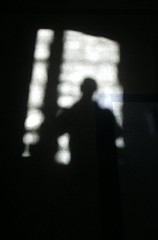Ofterdingen and Kropotkin
Sunday, December 18, 2011
Tuesday, December 13, 2011
ripatriarsi e ritornare
"Now you see that the hope and the desire of returning to the first state of chaos is like the moth to the light, and that the man who with constant longing awaits with joy each new spring-time, each new summer, each new month and new year - deeming that the things he longs for are ever too late in coming - does not perceive that he is longing for his own destruction. But this desire is the very quintessence, the spirit of the elements, which finding itself imprisoned with the soul is ever longing to return from the human body to its giver. And you must know that this same longing is that quintessence, inseparable from nature, and that man is the image of the world." (Leonardo da Vinci, "What is life?" in The Literary Works of Leonoardo da Vinci, Vol. II, (ed.) Jean Paul Richter, Phaidon, 1970 (first published 1883), p.242: link) || Auf welche Art hängt aber das Triebhafte mit dem Zwang zur Wiederholung zusammen? Hier muß sich uns die Idee aufdrängen, daß wir einem allgemeinen, bisher nicht klar erkannten – oder wenigstens nicht ausdrücklich betonten – Charakter der Triebe, vielleicht alles organischen Lebens überhaupt, auf die Spur gekommen sind. Ein Trieb wäre also ein dem belebten Organischen innewohnender Drang zur Wiederherstellung eines früheren Zustandes, welchen dies Belebte unter dem Einflusse äußerer Störungskräfte aufgeben mußte, eine Art von organischer Elastizität, oder wenn man will, die Äußerung der Trägheit im organischen Leben. [...] Der konservativen Natur der Triebe widerspräche es, wenn das Ziel des Lebens ein noch nie zuvor erreichter Zustand wäre. Es muß vielmehr ein alter, ein Ausgangszustand, sein, den das Lebende einmal verlassen hat, und zu dem es über alle Umwege der Entwicklung zurückstrebt. Wenn wir es als ausnahmslose Erfahrung annehmen dürfen, daß alles Lebende aus inneren Gründen stirbt, ins Anorganische zurückkehrt, so können wir nur sagen: Das Ziel alles Lebens ist der Tod, und zurückgreifend: Das Leblose war früher da als das Lebende. Sigmund Freud, Jenseits des Lustprinzips (1923): link || In what way is the instinctive connected with the compulsion to repetition? At this point the idea is forced upon us that we have stumbled on the trace of a general and hitherto not clearly recognised—or at least not expressly emphasised—characteristic of instinct, perhaps of all organic life. According to this, an instinct would be a tendency innate in living organic matter compelling it towards the reinstatement of an earlier condition, one which it had to abandon. [...] It would be counter to the conservative nature of instinct if the goal of life were a state never hitherto reached. It must rather be an ancient starting point, which the living being left long ago, and to which it harks back again by all the circuitous paths of development. If we may assume as an experience admitting of no exception that everything living dies from causes within itself, and returns to the inorganic, we can only say ' The goal of all life is death'-, and, casting back, 'The inanimate was there before the animated . (S. Freud, Beyond the Pleasure Principle: link)
Friday, December 09, 2011
rühmen, das ists
In 1710, Richard Steele wrote in Tatler that recently he had been to visit an old friend just come up to town from country. But the latter had already gone to bed when Steele called at 8 pm. He returned at 11 o'clock the following morning, only to be told that his friend had just sat down to dinner. "In short", Steele commented, "I found that my old-fashioned friend religiously adhered to the example of his forefathers, and observed the same hours that had been kept in his family ever since the Conquest." (T. Blanning, "Darkness visible", TLS September 23 2011, p.3) || Last month I read an Associated Press item about a man in Adams, Massachusetts, who, having bought the apartment building where his seventy-four-year-old grandmother has lived for ten years, raised her monthly rent from $96 to $400. She says that she can't afford to pay $400, because her income, from Social Security, is only $500. Also, she is a double amputee; in the newspaper that I saw - The Daily Hampshire Gazette, of Northampton, Massachusetts-the AP item was accompanied by a picture of her sitting in a wheelchair. You have to say this about the grandson, just for a start: this man has a public relations problem. (C. Trillin, Too soon to tell, New York, 1995, p.9)



